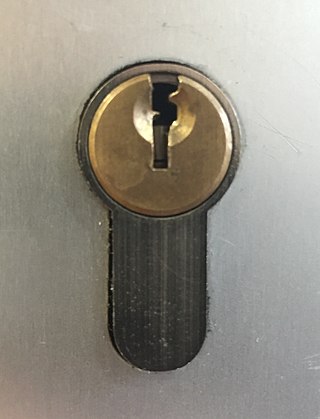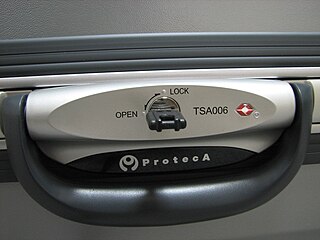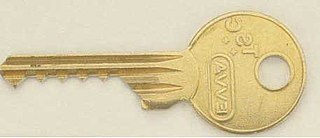
Lock picking is the practice of unlocking a lock by manipulating the components of the lock device without the original key.

The pin tumbler lock, also known as the Yale lock after the inventor of the modern version, is a lock mechanism that uses pins of varying lengths to prevent the lock from opening without the correct key.

A disc tumbler or disc detainer lock is a lock composed of slotted rotating detainer discs. The lock was invented by Finnish founder of Abloy, Emil Henriksson (1886–1959) in 1907 and first manufactured under the Abloy brand in 1918.

A combination lock is a type of locking device in which a sequence of symbols, usually numbers, is used to open the lock. The sequence may be entered using a single rotating dial which interacts with several discs or cams, by using a set of several rotating discs with inscribed symbols which directly interact with the locking mechanism, or through an electronic or mechanical keypad. Types range from inexpensive three-digit luggage locks to high-security safes. Unlike ordinary padlocks, combination locks do not use keys.

A tubular pin tumbler lock, also known as a circle pin tumbler lock, radial lock, or the trademark Ace lock popularized by manufacturer Chicago Lock Company since 1933, is a variety of pin tumbler lock in which a number of pins are arranged in a circular pattern, and the corresponding key is tubular or cylindrical in shape. Most locks use between six and eight pins, although some use as few as four or as many as ten. The devices have been widely used on vending machines, elevators, public computers, and bicycle locks.

A lock is a mechanical or electronic fastening device that is released by a physical object, by supplying secret information, by a combination thereof, or it may only be able to be opened from one side, such as a door chain.

A lever tumbler lock is a type of lock that uses a set of levers to prevent the bolt from moving in the lock. In the simplest form of these, lifting the tumbler above a certain height will allow the bolt to slide past.

A utility bicycle, city bicycle, urban bicycle, European city bike (ECB), Dutch bike, classic bike or simply city-bike is a bicycle designed for frequent very short, relatively slow rides through very flat urban areas. It is a form of utility bicycle commonly seen around the world, built to facilitate everyday short-distance riding in normal clothes in cold-to-mild weather conditions. It is therefore a bicycle designed for very short-range practical transportation, as opposed to those primarily for recreation and competition, such as touring bicycles, road bicycles, and mountain bicycles. Utility bicycles are the most common form globally, and comprise the vast majority found in the developing world. City bikes may be individually owned or operated as part of a public bike sharing scheme.

The Kensington Security Slot is part of an anti-theft system designed in the mid 1980s and patented by Kryptonite in 1999–2000, assigned to Schlage in 2002, and since 2005 owned and marketed by Kensington Products Group, a division of ACCO Brands.

A bicycle lock is a security device used to deter bicycle theft, either by simply locking one of the wheels or by fastening the bicycle to a fixed object, e.g., a bike rack.

Padlocks are portable locks usually with a shackle that may be passed through an opening to prevent use, theft, vandalism or harm.
Chicago Lock Co. is a lock manufacturer, founded in Chicago in 1920. Since 1933, it has sold a tubular pin tumbler lock marketed under the registered trademark "Ace." Millions of Ace locks have been sold; for instance, these locks are used in Northwestern Corporation's Triple Play bulk vending machine. In 2004 it was widely publicized that the barrel of a cheap ballpoint pen would act as an effective lock pick for many brands of tubular lock.

A luggage lock is a lock used to prevent luggage from opening by accident, usually with little or no security in mind, although the lock may serve as a deterrent to potential thieves. Luggage locks may be built into luggage or may be external locks such as padlocks or lockable straps.

Lock bumping is a lock picking technique for opening a pin tumbler lock using a specially crafted bump key, rapping key or 999 key. A bump key must correspond to the target lock in order to function correctly.

A wafer tumbler lock is a type of lock that uses a set of flat wafers to prevent the lock from opening unless the correct key is inserted. This type of lock is similar to the pin tumbler lock and works on a similar principle. However, unlike the pin tumbler lock, where each pin consists of two or more pieces, each wafer in the lock is a single piece. The wafer tumbler lock is often incorrectly referred to as a disc tumbler lock, which uses an entirely different mechanism.
Schlage is an American lock manufacturer founded in 1920 by Walter Schlage. Schlage was headquartered in San Francisco from its inception until it relocated to Colorado Springs, Colorado, in 1997. Schlage also produces high-security key and cylinder lines Primus, Everest, and Everest Primus XP. Schlage is one of the most popular brands of consumer and commercial locks in the United States.

A magnetic keyed lock or magnetic-coded lock is a locking mechanism whereby the key utilizes magnets as part of the locking and unlocking mechanism. Magnetic-coded locks encompass knob locks, cylinder locks, lever locks, and deadbolt locks as well as applications in other security devices.

Bicycle theft is the crime of stealing a bicycle. It is a common crime due to the relative ease of reselling bicycles, which have a large second-hand market. This makes the crime attractive to those needing to obtain currency quickly, such as people with substance addictions. Bicycles are also easily accessible, often being locked up outside in public places in urban areas. Despite the developed market of bicycle locks, it is estimated that millions of bicycles are stolen every year. Thieves use a variety of methods to bypass locks, including taking advantage of bicycle owners' poor locking practices. Bicycle owners can take action to reduce the chances of theft, including utilising facilities such as bicycle lockers and parking racks.
This is a glossary of locksmithing terms.



















